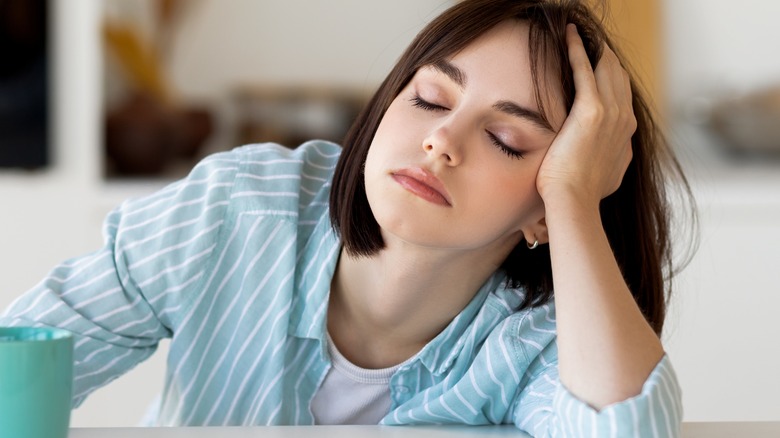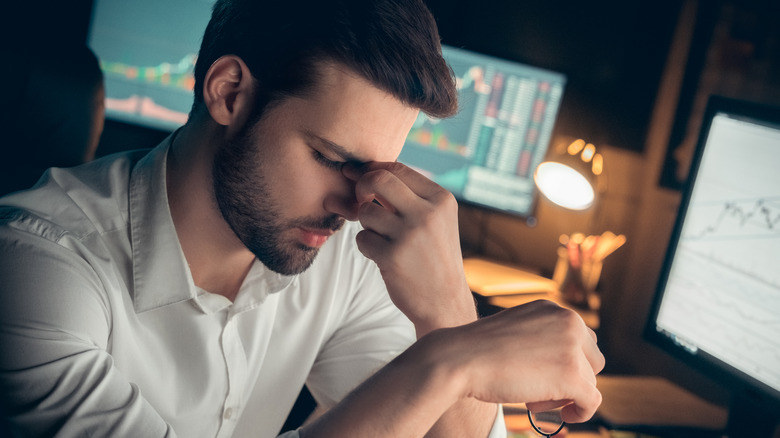How To Get Through The Work Day When You're Running On Little Sleep
No sound is as dreadful as that early morning alarm clock when it seems like you barely blinked. Falling asleep at night but not feeling rested in the morning is not only frustrating but quite inconvenient. While hitting the snooze button may sound like a good idea at the moment, it only delays the inevitable and never erases the tiredness plaguing your workday. Whether you have a terrible habit of staying up too late or you simply struggle with insomnia and can't fall asleep at night, consistently not getting enough shut-eye is a bad habit to fall into.
In the midst of your busy life, trying to justify a few self-care activities makes complete sense, and there are some great ways to unwind after work, according to science. Unfortunately, getting sucked into your favorite show, doing a leisurely skincare routine, or even losing track of time while scrolling on TikTok can all cause you to get into bed a little bit later each night.
Since quality sleep is directly linked to better overall health and wellness outcomes, navigating your overly tired state can be a real struggle, especially when you still have to be productive at work.
How to function when you're sleep deprived
While it's recommended that adults get at least seven hours of sleep each night, a third of 18- to 60-year-olds in America are chronically sleep deprived. This likely means that there will come a day when you stroll into the office with bags under your eyes, a cup of coffee in hand, and a slightly disheveled look on your face.
Luckily, there are a few hacks to survive the workday and remain a somewhat functioning employee. You might notice that every activity you try to complete during your workday feels like pulling teeth. Emails take longer to write, it's harder to think through topics with coworkers, and you may even feel frustrated by simple tasks. This is because your brain receives less blood when sleep deprived, which has a negative impact on your cognitive functioning. While a power nap may feel necessary if you're desperate, naps don't actually relieve sleep deprivation.
Neuroscientist Leigh Winters explained to NBC News that the best anecdote when you're tired is actually nature. Fresh, crisp air can really wake you up and keep you more alert throughout the day. Plus, taking slow deep breaths will bring more oxygen to your brain. On top of that, being outside in the sunshine for a few minutes during your workday won't just improve your mood but will also increase alertness because of the way light affects your circadian clock.
Try to prioritize your health and wellness
Sunshine helps to reset your circadian rhythm and establishes your sleep and wake windows. Despite being tired, you will feel much more physically and mentally awake if you avoid dark, dimly lit spaces while working.
You also may be tempted to reach for coffee throughout the day since that's the go-to cure for those in need of caffeine. However, moderation is your friend. For many people, an extra cup of coffee is a coin toss between energy and anxiety. Plus, when your body is already not feeling its best, fancy Starbucks drinks filled with sugar will likely lead to a crash. Instead, prioritize water, healthy meals, and nutrient-dense snacks. Keeping a consistent stream of quality calories in your system will help support your energy levels throughout the day, while highly processed options can make you feel groggy.
When you are running on little sleep, stillness is your enemy. Try to keep yourself moving to maintain higher energy levels. Of course, any sort of exercise may sound extra exhausting when you are overly tired, but it's all about finding ways to survive. Working on major projects or contemplating company-wide decisions is not advised when you are in a sleep-deprived state. Try to tackle the assignments that need to be completed and save any non-priority tasks for your well-rested self.



